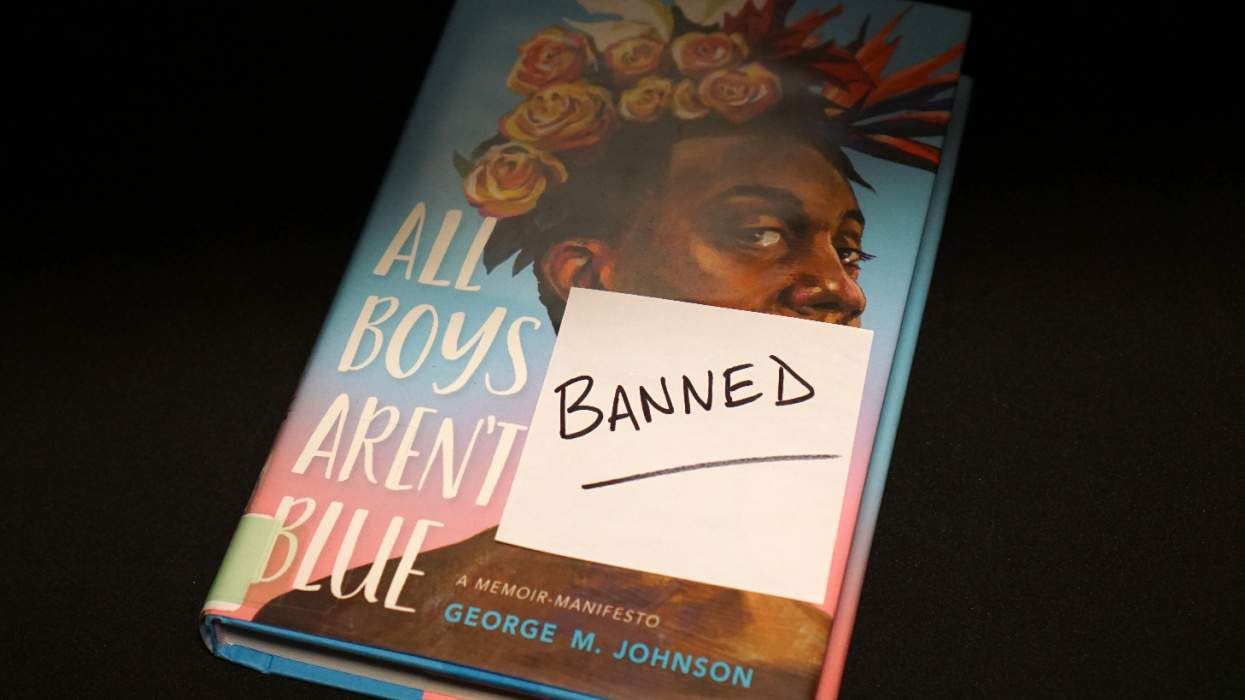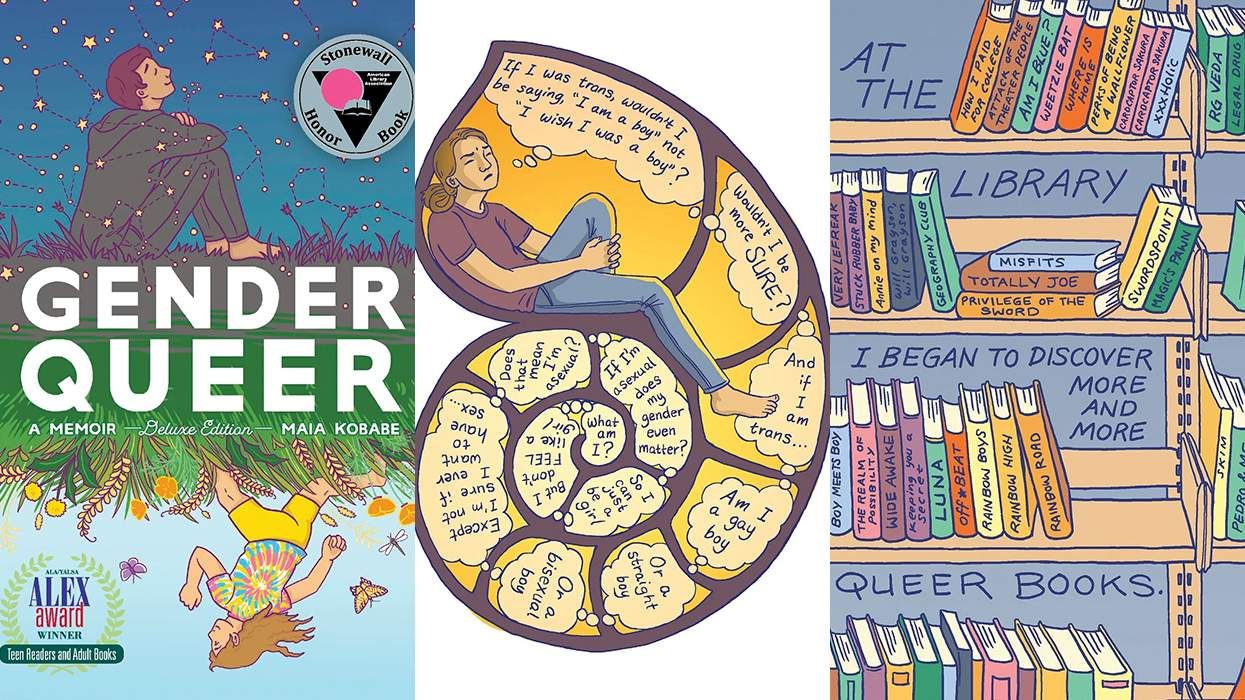For centuries, heterosexual people have defined what marriage is. It started out as a type of possession: "I own you." Hardly anchored in love, was it? And yet, this is the model that most of the human race has embraced for hundreds of years. Only in the last century or so has marriage begun to be based on love, mutual respect and understanding.
As two men considering getting married, we no longer have to do it "that" way. This is a cause for rejoicing! This is real freedom! So why aren't we more excited about this? Because this kind of freedom isn't easy. It's quite daunting to invent or re-invent a cultural institution that's been around longer than anyone alive can remember. It's so much easier to just follow what straight people have been doing and -- maybe -- modify it a little bit, tweak it just a tad.
This is certainly an option. But, given the power of our community to create and invent our own norms and institutions, why would we settle for that?
Marriage between two men is -- in my experience as a psychotherapist -- dramatically different than heterosexual marriage. It's a double testosterone marriage. With all that testosterone, sex is probably going to be handled quite differently for us than for some straight couples or even for some lesbian couples.
Let's be clear, I'm not saying that we are helpless victims of our libidos. Instead, we can be intelligent, aware creators of a new kind of marriage that acknowledges that two men together have unique gifts (and challenges) that other kinds of couples don't. Be prepared to rethink everything you've been told about marriage. The bottom line here is: Finally. we get to do it our way.
Many of our relationships start off monogamous. However, because sex is so important to a lot of us, it is my experience that about half of our relationships -- over time -- are not 100% monogamous. Whether married or not, many gay relationships begin to "open up" after the first few years. In the book, we'll follow two couples as they explore how to handle the desire for sex outside their marriages.
Many gay couples do want monogamy. But these couples often find themselves smack in the center of a community that only pays lip service to it. These couples want to be faithful to each other, but their community encourages them (both overtly and covertly) not to. Readily available sex doesn't make monogamy very easy.
I've had clients tell me that, shortly after they got married, their friends began to ask them questions like, "So, are you really going to be faithful to (husband's name)?" and "Everyone starts out monogamous at the beginning, but how do you pull that off when everyone around you wants to have sex with you?"
One client even told me, "Now that I'm married, so many more guys are hitting on me at the gym. I guess now that I'm not available, I'm a lot more desirable."
Sound like anyone you know?
For many of us considering marriage - or already married - the question of monogamy or open relationship looms large: it's both terribly important and terribly confusing. Deciding between the joys of Infinite sexual possibilities or the security of one person for the rest of your life is a huge Catch-22. How do we "win" here?
Many of my coupled gay clients, having examined traditional heterosexual marriage-based relationships, find them lacking. Other men, however, think that the idea of "emotional monogamy and sexual non-monogamy" is a cop-out, a way to rationalize not being faithful to your husband.
While this is a controversial issue, it's also an opportunity for us as married or potentially-married gay men to be social pioneers and make our own way. And I'm not just talking about sex here.
From my years of working with couples, I've noticed that gay couples typically experience two challenges more intensely than do opposite-sex or lesbian couples: competition and conflict. And that brings us to the key reason: testosterone.
Biologically, testosterone is crucial in maintaining maintain muscle mass, bone density and sex drive. It helps keep us youthful and energetic. However, it has its down sides: too much testosterone has been associated with risky behavior -- excessive consumption of alcohol and recreational drugs, high-risk sex, driving at unsafe speeds -- in many research studies. Anecdotally, I've observed that men with higher testosterone levels typically have a hard time curbing their aggression; this is bound to play out in their marriages.
Science has discovered that men's testosterone levels typically peak in our twenties and thirties, slowly decrease in our forties and fifties and are noticeably lower from our sixties onward. There are exceptions to this, of course, but this is the general trend. Therefore, it's not surprising to me that these "double testosterone" marriages of men in their twenties and thirties are much more likely to have formidable challenges in the competition and conflict departments.
When we get married young, our testosterone levels are higher, and we're likely to have lots of energy that we may not know how to channel constructively. We bring it into our marriage ... and we compete. ...
We compete with our husbands. A lot. And we compete over silly little things -- like, how to stack dishes in the dishwasher -- and some pretty important things -- like, who's the smartest, who makes the most money or is the most successful.
Competition, in moderation, is healthy. It's the "juice" of being alive, wanting to do well, enjoying success. But, too much competition leads to conflict, and conflict in a double testosterone marriage can easily lead to arguments that escalate out of control both verbally and physically.
On the other end of the testosterone spectrum, I've noticed that decreasing testosterone levels are often related to lower levels of sexual satisfaction (and more open relationships) in gay couples in their forties and fifties. Why? If sex has been a major cornerstone of our marriages/relationships and we hit an age where our sexual desires and libido take a dive, we may hope that opening up our relationship will be just the panacea we're looking for.
To be blunt -- testosterone can make us too horny when we're younger (creating trouble in marriages), and too disinterested in sex when we're older.
Same-sex marriage has been a long time coming -- a few thousand years or so -- and now that it's finally here, many gay, bisexual and transgender men may think that it's a bad idea to "rock the boat" by discussing the kinds of ideas that this book presents.
I believe that now is the perfect time to question what gay marriage can, should and will be, while it is still relatively new, fresh and malleable.
For the double testosterone marriage, "monogamy or open relationship?" is a question whose time has come.
Excerpted from Michael Dale Kimmel's The Gay Man's Guide to Open and Monogamous Marriage, released this month by Rowman & Littlefield.















Charlie Kirk DID say stoning gay people was the 'perfect law' — and these other heinous quotes
These are some of his worst comments about LGBTQ+ people made by Charlie Kirk.